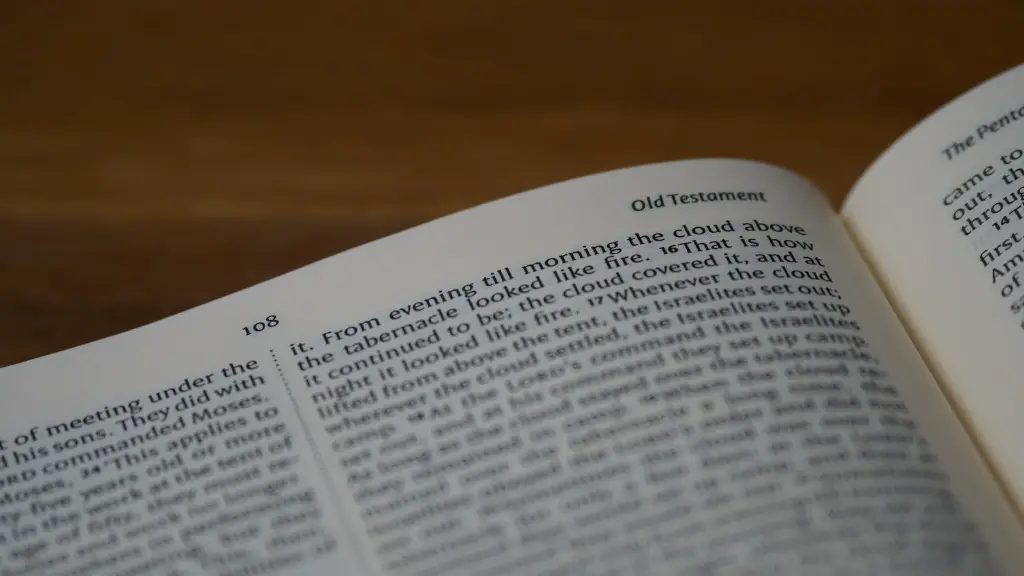Origin
Jasher, also known as The Book of Jasher, is a well-known ancient text of unknown authorship and origin. It claims to be a non-scriptural but inspired account of various Biblical events, written as an alternative and supplement to the Bible. While it has a long and storied history, it is not thought to be an original document from the ancient past but rather a Jewish narrative of varying later authorship.
The text is first mentioned in the Bible in the book of Joshua. It is described as “The Book of Jasher” and is one of the sources which is used to supplement the history given in the Bible. It is believed by some to be the work of a group of authors combining several ancient sources and documents, such as Assyrian and Egyptian annals, oral traditions and oral scriptures from diverse cultures.
Content
The Book of Jasher is an ancient historical account of the events that took place in the world up to and during the time of the Israelites in the Bible. It includes additional details on the stories of Creation, Noah’s Flood, and the written accounts of Abraham, Jacob, and other patriarchs of ancient Israel.
It also covers important events such as the Exodus, the crossing of the Red Sea, the giving of the Law, the destruction of the Tower of Babel, and other important stories. It also includes an account of the Ten Commandments, although it deviates from the traditional version found in other books.
The Book of Jasher claims that its source was the angel Uzziel and that it was written during the time of Moses at the command of Joshua. Thus, it is accepted by some as an inspired work of scripture.
Authenticity
The reliability, accuracy and historicity of the narrative have been debated for centuries. Jewish scholars have questioned the accuracy of the text, usually citing the age of the book, the variety of sources, and the discrepancies with the Bible. The Jewish Encyclopedia also states that much of the book is “apocryphal” and full of legendary and miraculous material.
Additionally, some scholars view some of the book’s account as being too biblical to be taken as an independent source. In other words, they argue that the text is too full of biblical ideas, events and personalities to be an independent narrative.
Modern Reception
In modern times, the Book of Jasher has gained popularity amongst some segments of the religious right. It has also been used by some as a source of spiritual direction, edification, and evidence of the Bible’s accuracy. However, this has also been met with some skepticism within the academic community.
Modern scholars, such as historians and theologians, often view it as an “unwarranted embroidery of the biblical narrative”. They have also noted its highly imaginative, often mythical, tone and the occasional lack of historical accuracy.
Conclusion?
The Book of Jasher is a fascinating ancient text which provides an alternate and supplemental account to the Bible. Its authenticity and accuracy have been debated for centuries, but it is still revered by some as a source of spiritual direction and edification. Despite its many critics, it remains a beloved part of biblical and religious lore.
Later Versions
The most common version of the Book of Jasher today is the 1840 edition that was edited by Jacob Ilive. This edition includes additional material that wasn’t found in the original editions and is believed to be the work of later authors.
This version gained widespread acceptance in the 19th century and remains the most popular edition today. But there have been other editions throughout history, including a 1751 edition published in Amsterdam which removed objectionable material in order to comply with then-current religious standards.
Hebrew Manuscripts
There are also a few surviving Hebrew manuscripts of the Book of Jasher which were written around the 11th and 12th century. These manuscripts provide us with insight into how people viewed and used the book in earlier times.
For instance, one of these manuscripts includes several commentaries on the text. These commentaries provide a valuable glimpse into how people in earlier eras interacted with the Book of Jasher.
Use In Judaism
In Judaism, the Book of Jasher is viewed as a pseudepigraphal book of a lower category of importance. It is not accepted as scripture, but it is respected and studied as a source of moral and religious instruction.
Rabbis and traditionalists have used it to supplement the Bible and illustrate moral teaching, often citing its poetic and imaginative qualities. This has helped to keep it alive even amongst those who do not necessarily accept its validity as a historical source.
Reception In Christianity
The Book of Jasher is rarely taken seriously as a historical document in Christianity. Much of its content is not consistent with Christianity’s core beliefs and the text is seen as historically inaccurate and unreliable.
For this reason, many Christian denominations do not accept or recognize the Book of Jasher as an inspiring work. Even though some passages may appear to corroborate certain scriptural events, the majority of Christian denominations do not accept the Book of Jasher as reliable source.
Traditional Jewish Education
The Book of Jasher is still recognized by some modern Jewish groups and is used as part of traditional Jewish education. This includes an informal curriculum of religious and moral education that is taught to children in many traditional Jewish schools.
In these places, the Book of Jasher is used to supplement the Bible, to impart moral teaching, and to provide an additional source of spiritual guidance. This has been the case for centuries, and continues to be the approach of many traditional Jewish schools today.


